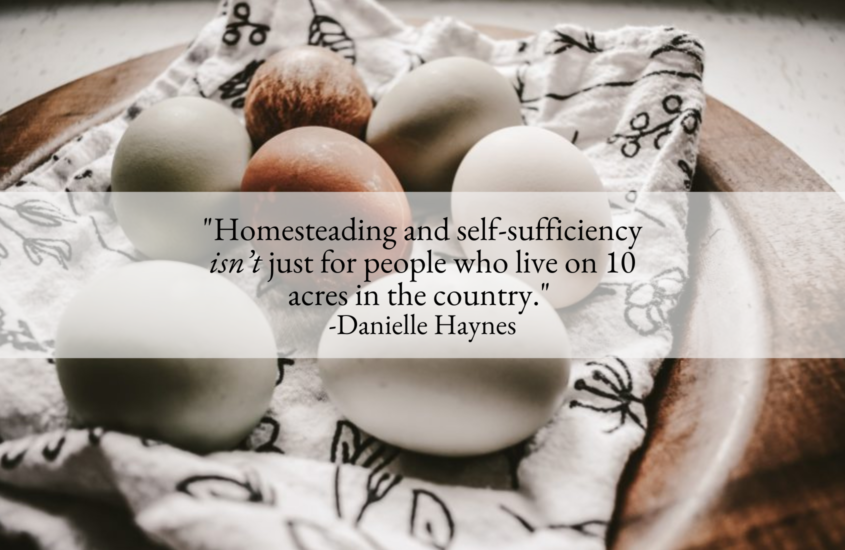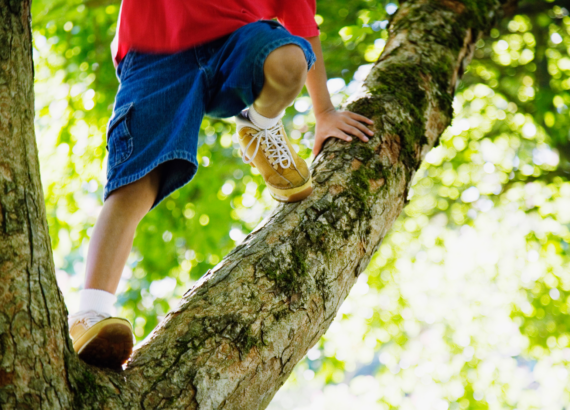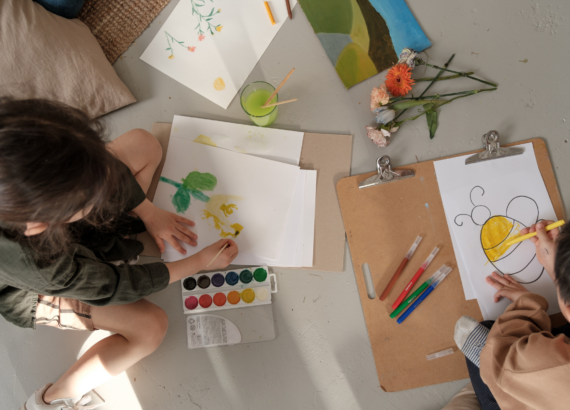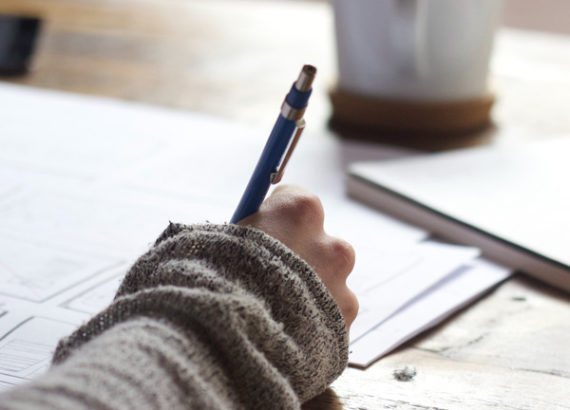Beginner Homesteading: Skills to Get Started No Matter Where You Live
Danielle Haynes | PC: Unsplash
PC: Unsplash Homesteading and self-sufficiency isn’t just for people who live on 10 acres in the country. Developing homesteading skills can begin long before you ever own land. In fact one common piece of advice I hear from other homesteaders is to get started early. Many of them wish they had started developing basic homesteading skills long before they actually had a homestead. In my case, I lived on land for years before I even built up the courage and motivation to get started. Don’t make the same mistake, get started now and you won’t regret it!
Grow Herbs and Learn How to Use Them
I resisted growing herbs indoors for years!! I waited till I had a garden before I really got into it. Don’t make the same mistake. It shocked me to learn how easy it is to grow herbs. Once you get started you’ll find that some herbs do wonderful inside and others take a lot of care. A couple of my favorite herbs to grow are sage, marjoram, and mint. They are strong & hardy plants. To start, try getting a couple of your most used herbs going either inside on a window sill or outside in a pot if you don’t have a yard.
Herbs can be easily preserved through drying. It’s pretty cut and dry (no pun intended) you can hang herbs in bundles which work best for herbs like sage, rosemary, lavender, marjoram and thyme. You can also bake herbs in the oven at 200 degrees which is a simple process. You just remove stems, place the herb leaves on a baking sheet and place them in the oven. The herbs that work best for oven drying are dill, parsley, oregano, mint and basil. You can also use a dehydrator if you have one. Drying herbs is one of the most satisfying homesteading activities in my opinion and once you start you won’t want to stop!
Bake Sourdough Bread
I have to say I was so intimidated by the process of starting to bake sourdough. But after making my own sourdough starter and learning to bake sourdough I’ve come to realize that the process is not that complicated. It’s relatively easy and once your starter is established you can bake just about anything with it. Getting a starter going is so simple all you need is two ingredients: unbleached flour and water. That’s it! Once you get the hang of sourdough you can experiment and create your own recipes. Here’s a link to the recipe I used to get started on my sourdough journey. Sourdough bread: A Beginners Guide
Learn to Ferment Vegetables
You can ferment just about any vegetable right in your kitchen and with just the tools available to us in local grocery stores like mason jars (or fermenting jars which you can find on Amazon). It really doesn’t require a lot of fancy equipment. The best things to start with are things like sauerkraut and pickles. Just make sure to purchase organic, high quality vegetables, and high quality salt whenever attempting to ferment. Lisa from Farmhouse on Boone has the ultimate guide to fermenting vegetables to get you started . She’s the queen of fermentation and sourdough in my opinion.
Find a High Quality Egg, Dairy and Meat Source
Backyard chickens are a real possibility if you have even a small backyard, but if you don’t, finding a local farmer (or multiple) can be a great benefit to anyone trying to eat more naturally and ancestrally. We are uniquely blessed as my husband is a hunter, his parents own a cattle ranch and my grandma has chickens. But even if you don’t have personal access, you can find many farmers online. Another effective way is to contact your local butcher shop or frequent the annual farmers markets to make connections. Your local grocery stores often have great connections, you may even find local farms being advertised in stores or on local Facebook groups. If you have a local Weston A. Price (WAPF) chapter in your area, you can reach out to them for dairy and egg contacts as well. Their site has contacts to local chapter leaders which you can access here.
Start Hunting and Fishing
Hunting and fishing is not as intimidating as you might think. You can start off with small game and fishing and move up to large game once you become more comfortable. You also don’t have to own a gun (although it’s much easier to hunt if you do) you can hunt with a crossbow, and all you need to fish is a fishing pole and some bait. Make sure you look into hunting and fishing regulations in your region and buy the necessary licenses to be in compliance with state law. It can also help to find out what’s available in your area. You might be able to find oysters, go crabbing, or even catch crawdads depending on where you live. Get to know your natural habitat and ecosystem and find out what’s safe to hunt, trap, or fish for. Hunting is the biggest skill that has provided my family with the ability to be self reliant. This year we provided about 70% of our own meat through hunting. In my experience, butchering wild game, learning to make game stock, and learning to cook with venison has been the best part of our homesteading experience.
If you or your husband are just starting out, I have the perfect resource for you to learn all about cooking with different types of wild game. My E-book A Hunter’s Wife’s Guide to Natural Cooking will be available soon as a part of the Back to Homemaking Collective. Follow me over on Instagram and keep any eye out for the launch date to be a part of an incredible group of women who are getting back to our roots and learning skills lost through the ages.
Learn to Ferment Dairy
This is still something that I am excited to learn more about. If you have access to a dairy farm, you can get started on this relatively easily. But even if you don’t, do not underestimate what you can do with regular store bought milk (organic whole milk or raw milk of course) . When fermenting dairy you can create your own cheese, yogurt and even kefir.
Learn to Garden
Gardening is not just for people with lots of land. You can start a raised garden with just a couple of garden beds in a small backyard or you can do container gardening which can be accomplished even in an apartment as you can put the containers out on a balcony or lined up by a large window. Growing herbs on the window sill is a beautiful way to start. Just start small and build upon what you have slowly. Above all, don’t be afraid to fail, that’s how you learn.
Start a Compost Bin
Composting is relatively easy. Compost is made up of decaying organic material such as egg shells, vegetable scraps, banana peels, and fruit scraps. You can also add organic materials from your yard such as leaves, bark, yard cuttings, and decaying plants or flowers. A compost bin can be made from just about anything you can use: a trash can, a plastic bucket, a large wood bin, or even straw bales. All it needs to thrive is proper airflow, and to be turned over consistently. You can also find compost bins for purchase online but making them yourself may be the cheaper option.
Make Homemade Butter
Making homemade butter is so simple it’s crazy to me that more people don’t know how to, especially if you consider the rising cost of butter. It’s even better if you have access to fresh cream but there are other options. You can buy raw milk in stores or from a farmer and use the cream on top. Most farms that sell raw milk don’t separate the cream from the milk, but be sure to check before buying if making butter is your intent. You can also buy heavy cream directly from the store to make butter. All you need is a stand mixer, food processor, or even a blender. I’ve made homemade butter by stirring it by hand and with a blender. Both work great, but of course the blender is much quicker.
Start Cooking Primarily from Scratch
Start off by learning the basics such as how to de-bone and cook a full chicken or cook a roast. I’m always shocked how few people learn basic cooking skills. One great tip is to buy cuts of good quality meat that you’re not used to cooking and learn how to perfect them one by one. If you buy your meat from a butcher you can experiment with the roast, and steak cuts, you can even keep the tongue and heart! But even if you don’t get your meat from a butcher you can buy a cut of meat from the store and try your hand at perfecting it.
Learning the basics like how to cook a chuck roast or a tri-tip will bring you so much confidence in the kitchen. Another way to cook from scratch is by trying your hand at simple things like baked bread, biscuits, bagels and even homemade broths including bone broths. These skills are such a great way to get going even when you don’t have land and these skills really prepare you well for the day you might have your own homestead or farm.
Develop Basic Foraging and Plant Identification Skills
This was the very first skill I began to develop when I wanted to get into homesteading, and honestly I think I might need to dive back into it because there’s just so much to learn. There are so many different plants to work with depending on your region. My favorites here in Washington state are yarrow, dandelion, wild mint, morel mushrooms, and even pine! When getting to know the plants in your own region make sure to be very careful, start with just identifying plants instead of eating and touching them. Get really good at identification and then dip your toes into the medicinal side of plants. But it goes without saying to never eat any plant or mushroom unless you are 100% sure of what it is and that it is safe!
Learn Basic Survival Skills
Learning the basics of outdoor survival will benefit you so much when you’re spending time outdoors, especially in the case of an emergency and in the case that you do buy land and become a homesteader in the future. Knowing simple things like where to find water in your region; how to start a fire with a flint or fire by friction method; learning to build a waterproof and safe outdoor shelter; and learning how to tell direction and time without a compass or clock. All of these skills are essential for any outdoorsman (or woman) to learn to be safe while spending time in nature, or hunting and fishing. Not to mention that learning these skills will give you confidence and help you adapt if you ever transition to homestead living.
All in all I hope your major takeaway from this post is that your circumstances do not need to be perfect for you to start honing your skills and get started at homesteading and self-sufficiency. No matter where you live, these tips will grow your capabilities and help you to become less dependent on the system, even if you were to just try your hand at one of these homesteading skills. It’s never too late to get started!
Happy homesteading
Take care, Danielle






